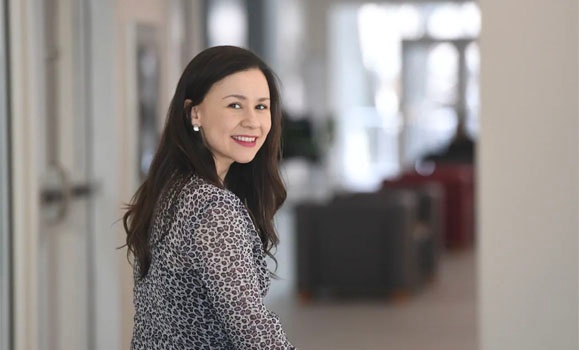Dalhousie professor Amy Bombay’s research on the intergenerational effects of residential school trauma has grabbed national headlines in recent years, influencing government policy and bolstering reconciliation efforts along the way.
But Dr. Bombay, an Anishinaabe from Rainy River First Nations in Ontario, has been a trailblazer for change inside the university as well.
In the five short years since she joined Dal with a cross-appointment in the School of Nursing and the Department of Psychiatry, she has become an advocate for reconciliation, cultural sensitivities and intergroup relations; an inspiring and trusted mentor to students; and a fount of knowledge for colleagues eager to learn more about the roots of inequities faced by Indigenous peoples today.
“It’s been interesting teaching people about this, students and health professionals and faculty,” she says. “My experience has been that it blows people’s minds. They’re upset that they were never taught about it and they think it’s really important.”
This week, Dr. Bombay received the President’s Awards for the Advancement of Equity, Diversity and Inclusiveness at the Dalhousie Legacy Awards for her work on such issues at the university.
Training the next generation
Dr. Bombay’s efforts in this regard have been multifaceted. She has taught professionals in training in both the Faculties of Medicine and Health. She redesigned a portion of the medical curriculum as component head of a large segment of the two-year professional competencies course, inviting Indigenous individuals in as lecturers and Indigenous Elders in as guest participants in the tutorial groups.
“This provides a unique intercultural opportunity for direct interaction between Indigenous Persons and Dalhousie medical students — an essential, direct, and unique aspect of training future health-care providers in the present Canadian context,” wrote two colleagues in a nomination letter.
Taking motivation from her own experiences as a young researcher in graduate school, Dr. Bombay has prioritized mentoring as many Indigenous students as possible. She remembers how much of a struggle it was in her early days as a researcher and the value her graduate supervisors brought as mentors.
“If it weren’t for them, I wouldn’t be doing this work,” she says. “They supported me so much and encouraged me. When I wanted to quit, they told me to keep going.”
Since 2014, Dr. Bombay has served as supervisor to 16 Indigenous students as well as six non-Indigenous students in their studies and research projects and through programs and volunteer networks. On top of that, she is one of four co-principal investigators involved in the establishment the Atlantic Indigenous Mentorship Network — a $1.5-million CIHR project that aims to expand and augment the capacity, skills and career trajectories of Indigenous trainees at post-secondary levels in Indigenous health research in the region.
“The students who come to me are so passionate and so intrinsically motivated by their strong feelings around social justice and around wanting to help their own communities. Really, it’s just been such a great thing to be able to support them and they in turn have been so appreciative. So, it’s really just a win, win, win all around, I think,” she says.
Empowering communities
Dr. Bombay’s research work often combines the use of quantitative measures to build on existing qualitative knowledge that has emerged from First Nations, Inuit or Metis communities and national Indigenous organizations.
This community-based approach empowers Indigenous peoples to lead research and community development efforts and ensures that projects are shaped by the needs of these specific communities and groups.
“All of my work has really come from those organizations and a lot of times we are saying things that we really already know but that policy makers need to hear and see in graphs,” she explains. “We’ve found that’s been really effective in getting our points across — making them in so many different ways that they are really kind of irrefutable.”
With $8.6 million in funding for research and projects over the past five years alone, it’s clear her approach to the field of Indigenous health research has garnered a lot of support.
A sought-after voice
Since joining Dal, Dr. Bombay has been an active member of various national and regional boards and networks, where she has brought an Indigenous perspective to bear on major health research issues and struck up innovative and collaborative new research projects.
She’s been a sought-after voice at Dal as well, taking an active role in several university and departmental committees focused on improving diversity and educational outcomes for students from underrepresented groups. She served as co-chair of the Dalhousie Committee on Aboriginal and Black/African Canadian Student Access and Retention, co-authoring the report that followed.
“It reflects a good thing that people are recognizing that we need to be considering indigenous perspectives in all of the decisions we are making. That’s often what I am providing within the committees. I don’t speak for all Indigenous people, obviously, but I can at least raise issues I know to be true and try to advocate for different perspectives.”

